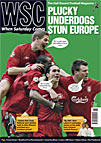 Believe it or not, but the Italians are going for an English job when it comes to stadium security, writes Matt Barker
Believe it or not, but the Italians are going for an English job when it comes to stadium security, writes Matt Barker
For most of this year the Italian press, spearheaded by a campaign in La Gazzetta dello Sport, have been calling for the introduction of a stewarding system all’inglese and the removal of perimeter fencing in the nation’s stadiums.
The police policy of containment, rather than intervention, is increasingly discredited, seen as instrumental in creating no-go areas. Bringing down fences (the majority of which first went up in the 1970s), coupled with a new tolleranza zero approach, is seen as a major step forward. Promises of a more proactive style of matchday policing had been made back in January, after a section of Roma’s travelling support disrupted a Coppa Italia game in Siena, holding play up for more than an hour as flares and smoke canisters rained down on the pitch.
The first to commit to the brave new world were Montecchio, down in the semi-amateur Serie D (where all stadiums currently have fencing). Shortly afterwards Bologna revealed their design for a revamped Stadio Dall’Ara, with open terracing, while Udinese announced they were looking to start next season with less fencing at their Friuli Piazzale stadium.
In Piacenza things proved more tricky. The relationship between the Serie B club and the fans has never been great, but took a turn for the worse after a home defeat against Salernitana in early March, when the four founders of the Sparuta Ultra group were arrested then banned from the ground for throwing flares. The Sparuta, who have occupied the Curva Nord end for the past 12 years, promptly disbanded and numbers in the previously buzzing home end have dwindled dramatically (sometimes struggling to reach three figures), despite the club still being in the play-off hunt.
Shortly after the arrests, director Maurizio Riccardi announced the club were going to take down the fences separating the curve from the running track encircling the pitch; the first move in a gradual process that will see all perimeter barriers come down. Agreement with the local council (the owners of the Stadio Leonardo Garilli), the carabinieri and the FIGC was secured – but supporters were kept out of any discussions.
Riccardi has long been confident fans would respond positively, but they are increasingly concerned. Suspicions remain that the arrested capi ultras were targeted by club and police as part of an operation to clear the terraces of any potential dissenting voices, before plans for an open stadium were made public.
The Piacenza crowd are, by reputation, a peaceful, apolitical bunch (they have won fair-play awards for being well behaved, although their “friendship” with Juventus means they aren’t short of enemies), but the police claimed the arrested fans were known troublemakers. So far, the disgruntled support base has made do with boycotting games, but calls for more direct action are beginning to be heard.
Born during the politically charged 1970s, the country’s ultra movement has always been highly organised and will be aware of the threat opening up the curve represents to their presence in the grounds. Italy’s bid to host Euro 2012 has taken a serious knock after recent problems and the government and clubs are determined to be seen to be doing something. Italian football is at something of a crossroads, caught between a desire to retain the choreography of ultra culture and a craving for Premiership-style stadiums and consumers. And, if a provincial side such as Piacenza have problems introducing change, it’s clear larger clubs will have to brace themselves for some stormy confrontations.
From WSC 220 June 2005. What was happening this month